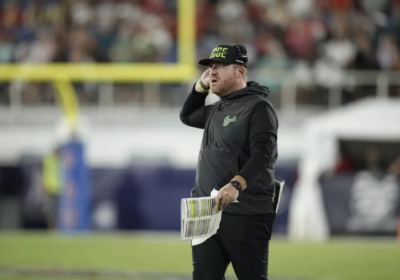Despite polls, Trump unlikely to win Florida primary

ORACLE PHOTO/ADAM MATHIEU
After Donald Trump’s visit to the USF Sun Dome Friday, many have questioned whether he has a chance at winning the Florida Republican primary on March 15.
The fact that many of Trump’s supporters are independent voters may hinder Trump’s success since Florida has closed primaries, meaning voters must be a member of a political party in order to participate.
This is much different than the New Hampshire primaries, in which Trump won by a substantial majority, and in Iowa, where he won second place. Both Iowa and New Hampshire have mixed primaries, in which independent voters may vote without having to change their status, or the political parties choose who can vote.
In fact, an exit poll from the New Hampshire primaries shows that 39 percent of voters were unaffiliated with a political party. This alone makes us question if he can have the same success in Florida, where only registered Republicans may participate in the Republican primary.
In order to vote in the Florida primaries, one must have registered to become part of one of the two main political parties by today, exactly one month before the primary. Since Trump does so well with independent voters in comparison to establishment Republicans such as Jeb Bush, a critical question is whether Trump’s independent supporters in Florida will choose to switch parties by the registration deadline.
Many of the polls in Florida show Trump is rising. The most recent polling data for Florida shows Trump at nearly 40 percent, which is up 6 percent from a month before. However, if his independent supporters failed to switch parties, he may not sweep in a victory at the polls.
Others are concerned with how Trump’s beliefs and comments would impact the vote of many Republicans in Florida who generally support his policies, but are insulted by his comments on issues such as immigration and the refugee crisis in the Middle East.
This would include many of the moderate voters, as well as Muslims and Hispanic-Americans. For example, his policy proposal to ban Muslim refugees from entering the U.S. has been met with criticism that it discriminates against Muslims and violates the First Amendment.
The loss of their vote would be detrimental to Trump winning Florida in both the primary and general elections.
One of the reasons for Trump’s appeal among independents is his ability to relate to voters who are angry with the political establishment in Washington. However, his ability to relate to these voters and lead in both national and state polls may not outweigh his comments and policy proposals, which have sparked protests and national criticism, including outside his rally at USF.
One protester, Amanda-Lynn Hill, a junior majoring in political science, was adamant that Trump did not represent the views of the majority of the American people.
“The reason I’m so opposed to him is that he expresses the views of my homophobic family,” Hill said.
Likewise, many of the people Trump insults in his comments are the same people needed to win the independent vote in Florida and ultimately win the general election.
This, combined with the fact that many of Trump’s supporters are not eligible to vote in the Florida primary, helps explain why a Trump victory in Florida could be out of the question.
Matthew Salway is a junior majoring in biology.







